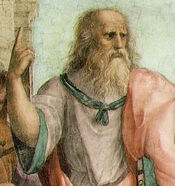Assessment |
Biopsychology |
Comparative |
Cognitive |
Developmental |
Language |
Individual differences |
Personality |
Philosophy |
Social |
Methods |
Statistics |
Clinical |
Educational |
Industrial |
Professional items |
World psychology |
Philosophy Index: Aesthetics · Epistemology · Ethics · Logic · Metaphysics · Consciousness · Philosophy of Language · Philosophy of Mind · Philosophy of Science · Social and Political philosophy · Philosophies · Philosophers · List of lists
| Platonism |
| Platonic idealism |
| Platonic realism |
| Middle Platonism |
| Neoplatonism |
| Articles on Neoplatonism |
| Platonic epistemology |
| Socratic method |
| Socratic dialogue |
| Theory of forms |
| Platonic doctrine of recollection |
| Individuals |
| Plato |
| Socrates |
| Discussions of Plato's works |
| Dialogues of Plato |
| Plato's metaphor of the sun |
| Analogy of the divided line |
| Allegory of the cave
|
Platonic idealism is the theory that the substantive reality around us is only a reflection of a higher truth. That truth, Plato argued, is the abstraction. He believed that ideas were more real than things. He developed a vision of two worlds: a world of unchanging ideas and a world of changing physical objects.
For example, a particular tree, with a branch or two missing, possibly alive, possibly dead, and with the initials of two lovers carved into its bark, is distinct from the abstract form of Tree-ness. A Tree is the ideal that each of us holds that allows us to identify the imperfect reflections of trees all around us.
Plato gives the divided line as an outline of this theory. At the top of the line, the form of the Good is found, directing everything underneath.
Some people construe "Platonism" to mean the proposition that universals exist independently of particulars (a universal is anything that can be predicated of a particular).
Platonism is an ancient school of philosophy, founded by Plato; at the beginning, this school had a physical existence at a site just outside the walls of Athens called the Academy, as well as the intellectual unity of a shared approach to philosophizing.
Platonism is usually divided into three periods:
- Early Platonism
- Middle Platonism
- Neoplatonism
Plato's students used the hypomnemata as the foundation to his philosophic approach to knowledge. The hypomnemata constituted a material memory of things read, heard, or thought, thus offering these as an accumulated treasure for rereading and later meditation. For the Neoplatonist they also formed a raw material for the writing of more systematic treatises in which were given arguments and means by which to struggle against some defect (such as anger, envy, gossip, flattery) or to overcome some difficult circumstance (a mourning, an exile, downfall, disgrace).
Platonism is considered to be, in mathematics departments the world over, the predominant philosophy of mathematics, especially regarding the foundations of mathematics.
One statement of this philosophy is the thesis that mathematics is not created but discovered. A lucid statement of this is found in an essay written by the British mathematician G. H. Hardy in defense of pure mathematics.
The absence in this thesis of clear distinction between mathematical and nonmathematical "creation" leaves open the inference that it applies to allegedly creative endeavors in art, music, and literature.
It is unknown if Plato's ideas of idealism have some earlier origin, but Plato held Pythagoras in high regard, and Pythagoras as well as his followers in the movement known as Pythagoreanism claimed the world was literally built up from numbers, an abstract, absolute form.
See also[]
- Cambridge Platonists
- Gnosticism
- Idealism
- Plato
- Platonic epistemology
- Philosophy of mathematics
| General: Philosophy: Eastern - Western | History of philosophy: Ancient - Medieval - Modern | Portal |
| Lists: Basic topics | Topic list | Philosophers | Philosophies | Glossary of philosophical "isms" | Philosophical movements | Publications | Category listings ...more lists |
| Branches: Aesthetics | Ethics | Epistemology | Logic | Metaphysics | Philosophy of: Education, History, Language, Law, Mathematics, Mind, Philosophy, Politics, Psychology, Religion, Science, Social philosophy, Social Sciences |
| Schools: Agnosticism | Analytic philosophy | Atheism | Critical theory | Determinism | Dialectics | Empiricism | Existentialism | Humanism | Idealism | Logical positivism | Materialism | Nihilism | Postmodernism | Rationalism | Relativism | Skepticism | Theism |
| References: Philosophy primer | Internet Encyclo. of Philosophy | Philosophical dictionary | Stanford Encyclo. of Philosophy | Internet philosophy guide |
| This page uses Creative Commons Licensed content from Wikipedia (view authors). |
